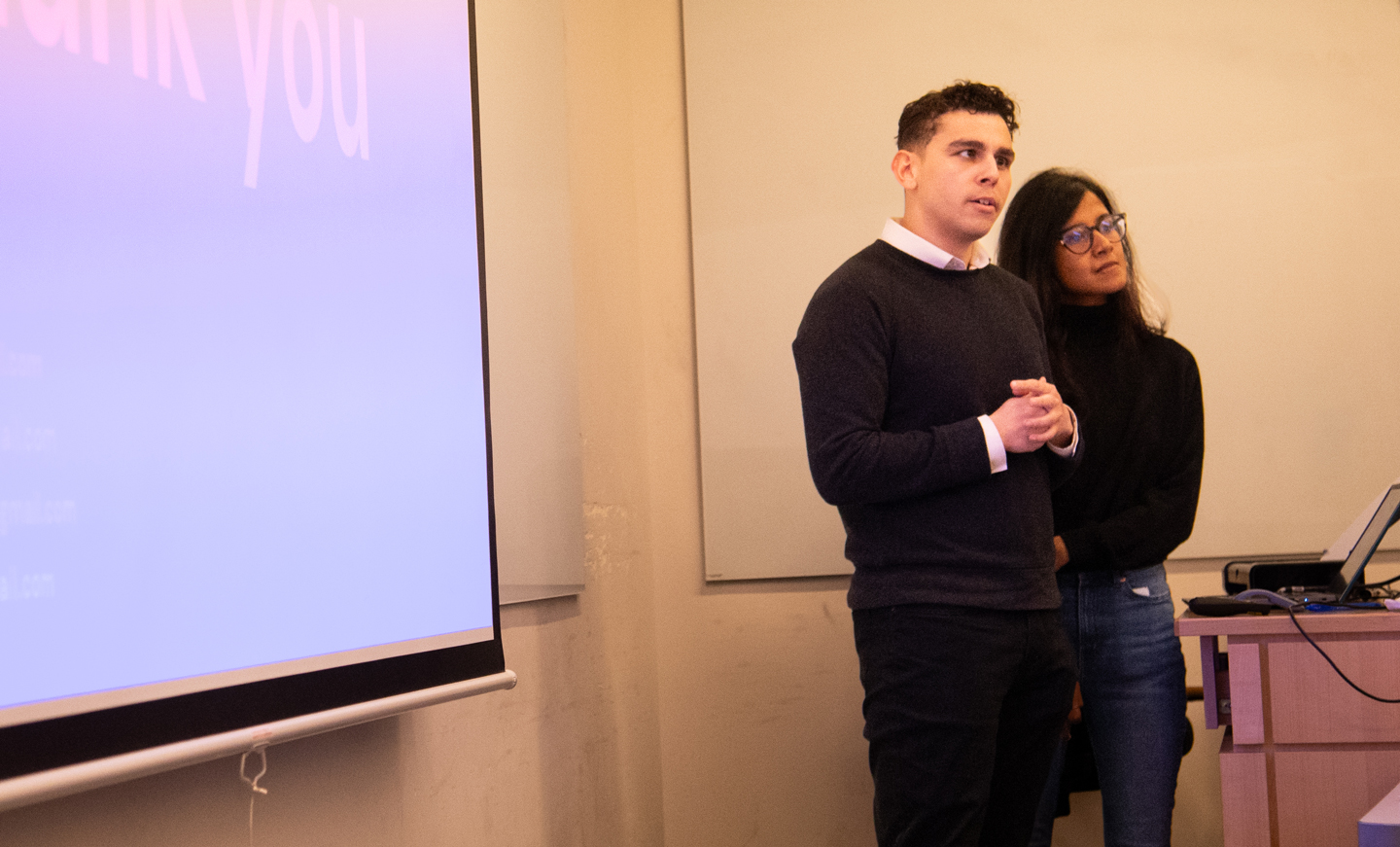The promise of AI can be seen in a service like Pivot, which offers mid-career professionals a way to easily switch from one job to another. A nurse who wants to become a data analyst could log on to the career-transition platform, answer a few questions and upload a resume.
The platform, backed by artificial intelligence and the expertise of human resources professionals, would provide a path forward, highlighting skill gaps, refining a resume and cover letter, and even automatically applying for jobs.
Pivot doesn’t exist. Not yet. But it could.
It’s one of the inaugural projects supported by the new iStartup Lab at the University of Washington’s Information School. The lab serves as a business incubator, allowing iSchool students to work on ventures while developing entrepreneurial skills and completing their degrees.
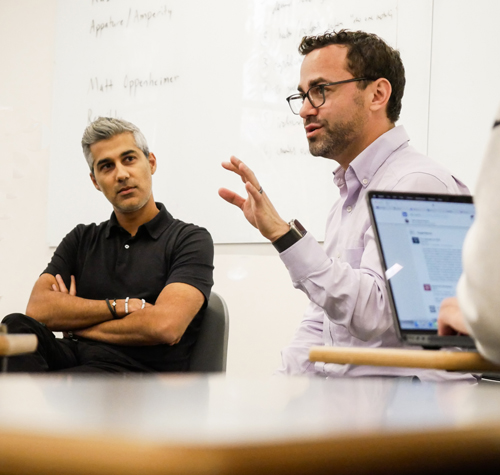
Pivot founders Lelo Gemtessa, Adrian Lavergne, Shinjini Guha and Menita Agarwal developed the idea in one of two entrepreneurship courses offered by the iSchool this past fall. (Pictured at top: Members of the team present their idea during class.) The students, who are pursuing master’s degrees in information management, have experience transitioning from one career to another.
“The current job application process can be very repetitive and time-consuming,” Gemtessa said. “The skills needed to be able to switch careers could be kind of vague and unknown.”
They discovered this shared aggravation with changing careers in the upper-division course Foundations of Entrepreneurship, developed and taught by iSchool Assistant Professor Mike Teodorescu.
“I have learned so much in this course; I think all of us have,” Lavergne said. “It has been amazing to be able to tangibly dive into something that we're creating. [This course was] very hands-on in a way that’s a bit rare in higher education.”
Teodorescu and iSchool Assistant Teaching Professor Jeremy Zaretzky are the co-directors of the iStartup Lab, which they launched this school year. Zaretzky developed and teaches the undergraduate course on entrepreneurship fundamentals.
In addition to their courses, the two professors are developing a series of events for the iSchool community, including presentations from experienced startup founders, panel discussions and mentor-led workshops. The iStartup Lab also plans to offer microgrants of $500 or $1,000 to help qualified teams offset initial costs. A startup competition is planned for the 2024-25 school year.
Both Teodorescu and Zaretzky have extensive experience in the startup world. Teodorescu holds several patents and is the co-founder of a startup called SurgiBox, which creates a battery-powered “operating room in a backpack” and has been designated one of the best inventions of 2023 by Time magazine.
Zaretzky has more than 20 years of experience as a startup founder and has also led several initiatives to support entrepreneurship in the Seattle area, including serving as managing director of the Founder Institute accelerator program. He’s also currently a venture partner at Loyal VC, a venture capital fund that has invested in more than 350 startups.
The iStartup Lab has an advisory board of 14 experienced entrepreneurs, investors and business leaders, including several iSchool alumni. Alum Kabir Shahani, a multi-time startup founder, is a member of the board and also served as co-instructor for Zaretzky’s entrepreneurship course.
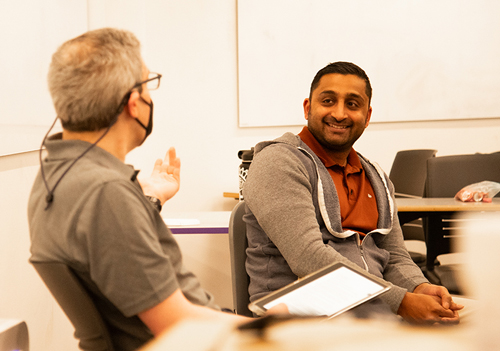
Ultimately, the lab aims to help students use the technical and data skills learned in the iSchool to build a business venture with a social mission. Teodorescu saw similar startup initiatives when he studied at Harvard University and was a startup judge at the Massachusetts Institute of Technology and previously a participant in several startup incubators on the East Coast.
“I thought it would be amazing if we could replicate that here with a focus on data science for good, not just making money,” Teodorescu said. “Use your data science skills to build a company that does more than just profit, right? One that would have a positive impact on the world.”
Startups that focus on a mission tend to have more of a chance to succeed, Zaretzky said.
“We know at least anecdotally that founders who are starting a company and running it and persisting with it because they feel there's a mission beyond just making themselves rich, tend to stick with things longer and make better decisions than those who are just trying to pursue a relatively fast path to wealth,” Zaretzky said.
Last year, the iSchool surveyed more than 100 students about their interest in entrepreneurship, the resources available, and what the students would like to see. The iSchool also conducted 12 in-depth interviews with students.
“That really informed what we decided to build and prioritize during the initial phase of this,” Zaretzky said.
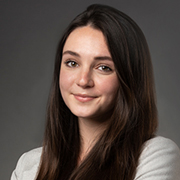
One of the advisory board members, Jax Morgan, was an iSchool student last year and helped conduct the interviews. Morgan now works in the Bay Area for a technology investment fund. When she was interviewing students last year, she found palpable excitement about how the iSchool could nurture startups.
“There are so many hurdles that a lot of students experience when even thinking about whether this is something that they can pursue,” Morgan said. “Being able to target some of those issues in a really intentional way will elevate students' eagerness to engage with the lab.”
When the lab was first proposed, some people suggested the iSchool could have a stake in the future startups it supports, but both Zaretzky and Teodorescu insist that there needs to be no strings attached to the fledgling companies.
“If they're happy and they want to come back to give a lecture or share their wisdom with the next generation of students, that would be great,” Teodorescu said. “If they want to somehow support the entrepreneurship opportunities at the university when they're able to, fantastic.
“But there's no obligation whatsoever. That's how it should be for young people to really be able to thrive.”
One of Zaretzky’s students in the undergraduate entrepreneurship course this past fall was Jake Harper, who is already a budding entrepreneur. The junior Informatics major has released two online tools to help the academic pursuits of his fellow students.
One is called GradePoint, which shows the grade-point average of all the courses at the UW to help students determine the difficulty of each class. The other is GetUWMajor, which helps students sharpen their applications for the university’s capacity-constrained majors.
While neither tool is sanctioned by the UW, Harper has found a thrill in “creating something and putting it out there.”
“I've only had a taste of that feeling so far,” Harper said. “I think the further I go within entrepreneurship, the more of an impact I can make. I see all of that as being fulfilling beyond just a career but fulfilling as a way of life.”
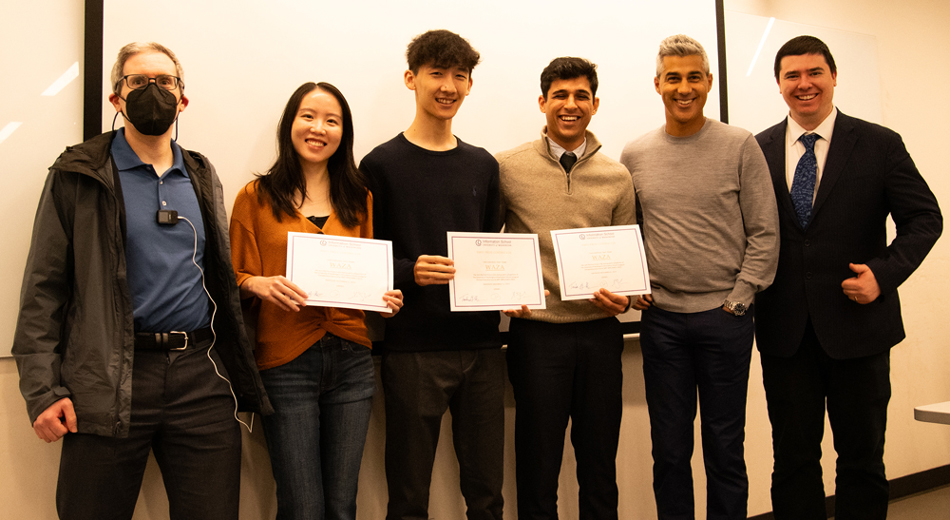
Part of the goal of the iStartup Lab is to give a clear view of what the startup journey is really like. When people hear about startups, they hear about incredible financial numbers, and everything going to the moon. Zaretzky said that’s largely a survivorship bias and there are struggles that aren’t always highlighted.
“One of our guiding principles here was helping students understand what the entrepreneurial career path looks like,” Zaretzky said.
Entrepreneurs must truly love or believe in what they’re building, Teodorescu said. It can’t be something that’s artificial. “You must have the strength to hear a hundred no’s and one yes,” Teodorescu said.
The iStartup Lab aims to illuminate that path forward to help another generation of entrepreneurs.
“The entire startup idea was like a black box, something that seemed unachievable,” said Guha, who is working on the Pivot project. “But Mike and all the speakers that he brought shared their experiences, which made it sound more possible, which made it more exciting.”
